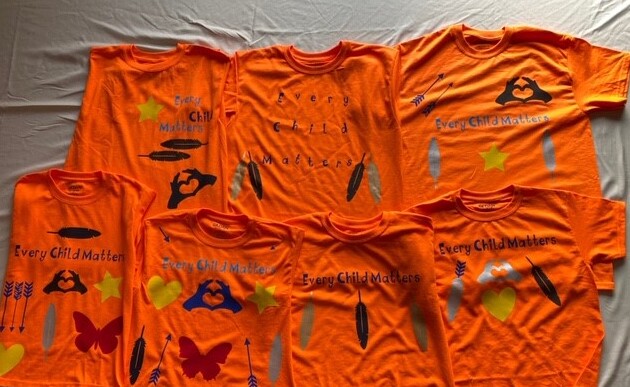Every child matters.
But it’s much more complicated than that. As Ranch Ehrlo staff participated in Orange Shirt Day, questions around the reasoning for wearing orange came up from the children in their lives – their own and those they care for in our programs.
Family Treatment Program (FTP) staff member Linda Kayseas-Paslowski recounted the conversation she had with her young son.
She explained to him that Orange Shirt Day was a day to remind all children that they should love themselves and be proud of who they are and where they came from – that every child, no matter what racial background they come from, matters.
She also explained about the history of residential schools and how so many children had been taken from their families and stripped of their culture, language, and community ties. We wear orange shirts to let those children know they matter and what they went through won’t be forgotten.
FTP manager Sharon Miller took the opportunity to have the first of many conversations with her three-year-old. She explained that a long time ago, children in certain schools weren’t treated very well, and added, “We wear orange shirts to remember to love and be nice to ALL children. We are nice to everyone - no matter what!! It doesn’t matter if they are boys or girls or have different colour skin.”
For Treatment Foster Care parents Heather Whitequill and Quincy Dustyhorn, the matter is one they, their own children, and all the children in their care are affected by. Their children listened to “The Orange Shirt Story” before making orange shirts of their own.
“We wanted them to understand how residential schools impacted them even though they didn’t go to one,” Heather explained. “It’s a common experience for all of us.”
In spite of what is sometimes a complicated history, Heather and Quincy stress the importance of all their children being proud of where they come from – on Orange Shirt Day and always.
“There’s a stigma, when you’re in care, and especially when you’re First Nations, and we want our kids to know they should be proud of themselves and what they’ve overcome.”
Heather and Quincy stress the importance of forgiveness along with their teaching.
“We wanted them to understand that it’s not okay for people to hurt them, but it is okay for us to forgive them.”


